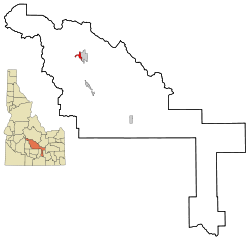Ketchum, Idaho
| Ketchum, Idaho | |
|---|---|
| City | |
 |
|
| Motto: "Small town, big life." | |
 Location in Blaine County and the state of Idaho |
|
| Coordinates: 43°40′52″N 114°22′18″W / 43.68111°N 114.37167°WCoordinates: 43°40′52″N 114°22′18″W / 43.68111°N 114.37167°W | |
| Country | United States |
| State | Idaho |
| County | Blaine |
| Founded | 1880 |
| Government | |
| • Mayor | Nina Jonas |
| Area | |
| • Total | 3.08 sq mi (7.98 km2) |
| • Land | 3.05 sq mi (7.90 km2) |
| • Water | 0.03 sq mi (0.08 km2) |
| Elevation | 5,853 ft (1,784 m) |
| Population (2010) | |
| • Total | 2,689 |
| • Estimate (2012) | 2,680 |
| • Density | 881.6/sq mi (340.4/km2) |
| Time zone | Mountain (MST) (UTC-7) |
| • Summer (DST) | MDT (UTC-6) |
| ZIP code | 83340 |
| Area code(s) | 208 |
| FIPS code | 16-43030 |
| GNIS feature ID | 0397833 |
| Website | ketchumidaho.org |
Ketchum is a city in Blaine County, Idaho, United States, in the central part of the state. The population was 2,689 at the 2010 census, down from 3,003 in 2000. Located in the Wood River Valley, Ketchum is adjacent to Sun Valley and the communities share many resources; both sit in the same valley beneath Bald Mountain, with its world-famous skiing. The city also draws tourists from around the world to enjoy its fishing, hiking, trail riding, tennis, shopping, art galleries, and more. The airport for Ketchum, Friedman Memorial Airport, is approximately 15 miles (24 km) south in Hailey.
Originally the smelting center of the Warm Springs mining district, the town was first named Leadville in 1880. The postal department decided that was too common and renamed it for David Ketchum, a local trapper and guide who had staked a claim in the basin a year earlier. Smelters were built in the 1880s, with the Philadelphia Smelter, located on Warm Springs Road, processing large amounts of lead and silver for about a decade.
After the mining boom subsided in the 1890s, sheepmen from the south drove their herds north through Ketchum in the summer, to graze in the upper elevation areas of the Pioneer, Boulder, and Sawtooth mountains. By 1920, Ketchum had become the largest sheep-shipping center in the West. In the fall, massive herds of sheep flowed south into the town's livestock corrals at the Union Pacific Railroad's railhead, which connected to the main line at Shoshone.
...
Wikipedia
